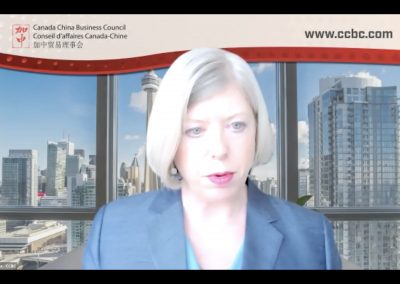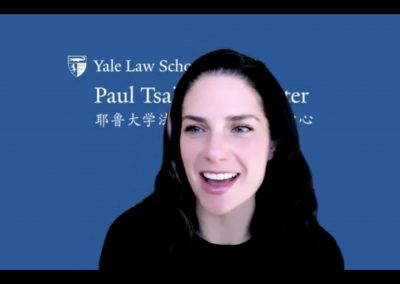Navigating Complexity: US-China Policy Impact on Canada – Session 1: US-China Policy & Business Impact
Navigating Complexity: US-China Policy Impact on Canada – Session 1: US-China Policy & Business Impact
On March 22, 2022 at 11 am EDT, the Canada China Business Council (CCBC) hosted Session #1 in the Navigating Complexity: US-China Policy Impact on Canada three-part webinar series. This session featured Samm Sacks, Senior Fellow at Yale Law School Paul Tsai China Center & Cyber Policy Fellow, New America.
Click here to download the handout PDF.
Session #1 – titled US-China Policy & Business Impact – principally examined technology policy, a highly relevant topic for attendees across a range of backgrounds. With many policy directives from both Beijing and Washington centering on the technology ecosystem – as opposed to trade and tariff conflict – there are new implications for stakeholders in a variety of sectors, ranging from retail to consumer healthcare.
The link to the video presentation is available upon request. Please contact your regional Chapter Director to request access:
• Atlantic: Edward Dai
• Quebec: Philippe Jeanneau
• Ontario: Jeff Zhang
• Prairies: Philippe Jeanneau
• BC: Philippe Jeanneau
• Beijing: Noah Fraser
• Shanghai: Edward Dai
The presentation first centred on risks from the U.S. side, including an overview of the American technology policy toolkit, including export controls, CFIUS, and ICTS investigations. It was noted that some of these tools mimic the broad national security authority that the Chinese government has used for years, sometimes as a form of market access barrier. On balance, however, there are differing views from within the policymaking community on how best to balance both market integration (with China and others) and American competitiveness on the global business stage.
On the Chinese side, developments in technology policy have – broadly – been characterized as a regulatory “storm,” with high profile targets bearing the brunt of increasingly restrictive measures. There is an effort from within the country to reign in firms more effectively and ensure that core Party values are espoused via the private sector. Data security and regulatory policy – the focus of Session #2 – also plays a key role in any discussion of technology policy.
These risks extend to both domestic and foreign companies operating in either environment, although the roadblocks manifest differently depending on firm orientation. While several so-called “impossible” policy trade-offs exist, there are still opportunities for savvy (and cautious) companies operating in both China and the U.S. Firms are undoubtedly reevaluating their business activities but relocating offices and diversifying supply chains is a complicated (and expensive) process.
CCBC thanks CanExport Associations for partial funding support for this program. Registration was free of charge for members; $25+tax for non-members per session. Simultaneous French interpretation was available for each session.
About the speaker:

Samm Sacks
Senior Fellow at Yale Law School Paul Tsai China Center & Cyber Policy Fellow, New America
Samm Sacks is a Senior Fellow at Yale Law School’s Paul Tsai China Center and a Cybersecurity Policy Fellow at New America. She also consults corporate clients on China’s technology policies. Her research examines China’s information and communications technology (ICT) policies, with a focus on China’s cybersecurity legal system, the U.S.-China technology relationship, and the geopolitics of data privacy and cross-border data flows. She has worked as an analyst of China’s technology policies for the last decade, both in the private sector and in the national security community. Previously she launched the industrial cybersecurity business for Siemens in Asia and led China tech coverage for the political risk firm Eurasia Group. Her writings have appeared in Foreign Affairs, The Atlantic, MIT Tech Review, Slate, and she has testified numerous times before Congress on the U.S.-China technology relationship. She reads and speaks Mandarin and was a Fulbright Scholar in China.



